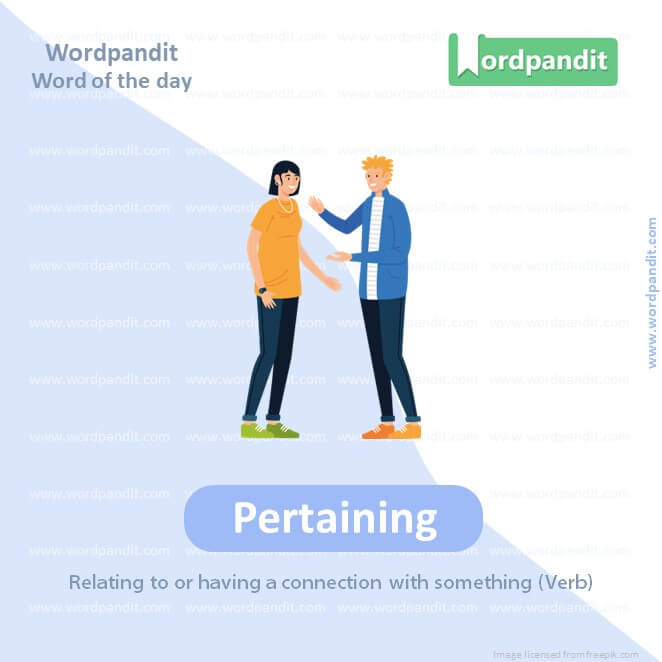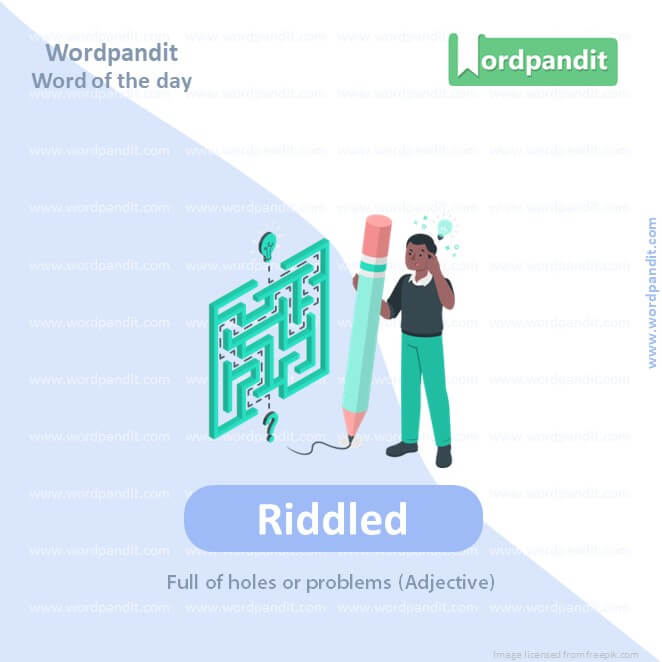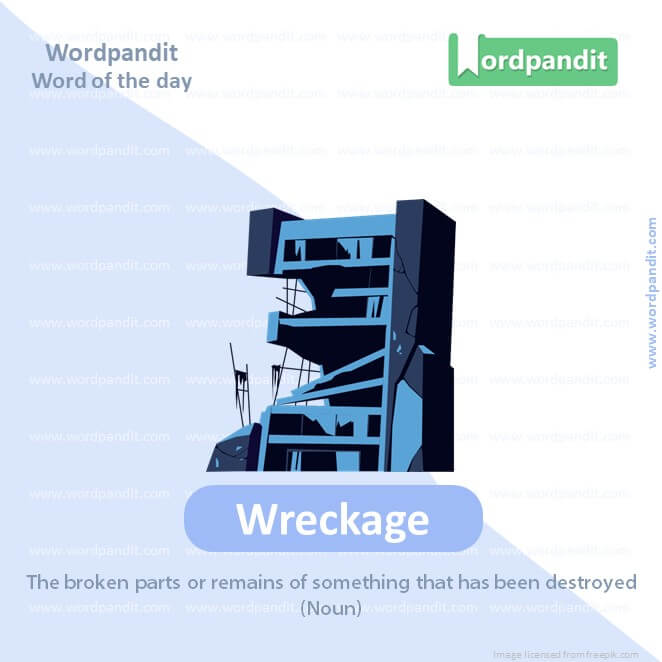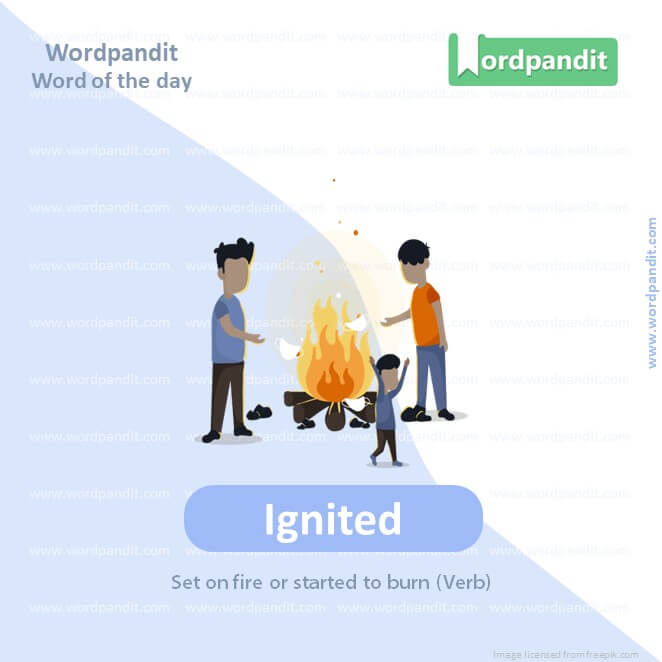Daily Vocabulary Words: List of Daily Used Words in Leading Indian Newspapers
Hi there. Welcome to this special section @ Wordpandit. Our endeavour here is straightforward: highlighting daily vocabulary words that you would come across in leading newspapers in the country. We have included the following newspapers in our selection:
• The Times of India
• The Economic Times
• Hindustan Times
• Mint
• Indian Express
We are putting in extensive work to develop your vocabulary. All you have to do is be regular with this section and check out this post daily. This is your repository of commonly used words; essentially, we are posting a list of daily used words. Hence, this has significant practical application as it teaches you words that are commonly used in leading publications mentioned above.
Visit the website daily to learn words from leading Indian newspapers.
WORD-1: Drenched
CONTEXT: California was drenched by a strong storm on Thursday, which caused widespread damage across the state.
SOURCE: Not provided
EXPLANATORY PARAGRAPH: Imagine playing outside in the rain without an umbrella and getting completely soaked. When you’re that wet, you are “drenched.” It means your clothes and hair are very, very wet, like you just jumped into a pool.
MEANING: Soaked with liquid, extremely wet (adjective).
PRONUNCIATION: DRENCHT
SYNONYMS: soaked, saturated, wet through, sopping, waterlogged
USAGE EXAMPLES:
1. After the downpour, they were drenched to the skin.
2. The drenched towels were hung out to dry.
3. She got drenched from the unexpected splash.
4. Walking home in the storm left him completely drenched.

WORD-2: Toxicology
CONTEXT: A tragic incident that left three Kansas City Chiefs fans dead from hypothermia last month has taken a new twist, as Fox 4 KC reported that illegal drugs were detected in their toxicology reports.
SOURCE: Not provided
EXPLANATORY PARAGRAPH: Imagine scientists who study poisons and how they affect people, animals, and plants. This study is called “toxicology.” It helps understand which substances are harmful and how to treat poisonings.
MEANING: The study of poisons and harmful substances and their effects on
living things (Noun).
PRONUNCIATION: tok-si-KOL-uh-jee
SYNONYMS: poison study, science of toxins, toxic science
USAGE EXAMPLES:
1. He specializes in forensic toxicology.
2. Toxicology tests were conducted to determine the cause of the illness.
3. The course covers basic principles of toxicology.
4. Toxicology is crucial in developing new medications.

WORD-3: Pertaining
CONTEXT: It reported that this was the only sentence remaining from the document pertaining the India as the rest was redacted.
SOURCE: Not provided
EXPLANATORY PARAGRAPH: Imagine talking about all the things related to your favorite hobby, like everything you do and use for it. When you talk about things “pertaining to” your hobby, it means things that are connected or related to it.
MEANING: Relating to or having a connection with something (Verb).
PRONUNCIATION: per-TAY-ning
SYNONYMS: regarding, concerning, related to, connected with, about
USAGE EXAMPLES:
1. All documents pertaining to the case must be submitted by Friday.
2. She made a presentation on topics pertaining to environmental sustainability.
3. The lawyer asked questions pertaining to the witness’s statement.
4. He researched techniques pertaining to digital marketing.

WORD-4: Riddled
CONTEXT: a car parked at the residence as well as the home were riddled with bullets.
SOURCE: Not provided
EXPLANATORY PARAGRAPH: Imagine looking at a piece of wood that has lots of tiny holes because bugs have been eating it. The wood is “riddled” with holes, which means it has many small holes or problems spread throughout it.
MEANING: Full of holes or problems (Adjective).
PRONUNCIATION: RID-uhld
SYNONYMS: permeated, infested, full of, beset, plagued
USAGE EXAMPLES:
1. The old ship was riddled with rust.
2. His statement was riddled with inaccuracies.
3. The software was riddled with bugs.
4. The walls were riddled with bullet holes.
WORD-5: Issuance
CONTEXT: India suspended visas issuance to Canadians right after Trudeau’s statement but that was restored in November.
SOURCE: Not provided
EXPLANATORY PARAGRAPH: Imagine when you get a library card or a passport, someone official gives it to you so you can use it. This act of giving out something official like a card or a document is called “issuance.”
MEANING: The action of supplying or distributing something, especially officially (noun).
PRONUNCIATION: ISH-oo-uhns
SYNONYMS: issuing, distribution, dispensation, provision, release
USAGE EXAMPLES:
1. The issuance of passports is handled by the government.
2. There was a delay in the issuance of licenses.
3. The company announced the issuance of new stocks.
4. The policy governs the issuance of building permits.
WORD-6: Engulfing
CONTEXT: The footage showed a thick cloud of white smoke rising from the wreckage and the flames engulfing the trailers.
SOURCE: Not provided
EXPLANATORY PARAGRAPH: Imagine a huge wave at the beach that comes up and covers everything around it with water. That big wave “engulfs” whatever is in its way, which means it completely surrounds or covers it.
MEANING: Sweeping over something so as to surround or cover it completely (verb).
PRONUNCIATION: en-GULF-ing
SYNONYMS: enveloping, swallowing, overwhelming, consuming, submerging
USAGE EXAMPLES:
1. The flames quickly began engulfing the building.
2. He felt engulfed by sadness after hearing the news.
3. The small village was engulfed by the expanding city.
4. Darkness engulfed the room as the lights went out.

WORD-7: Wreckage
CONTEXT: The footage showed a thick cloud of white smoke rising from the wreckage and the flames engulfing the trailers.
SOURCE: Not provided
EXPLANATORY PARAGRAPH: Imagine after a big storm you see broken pieces of boats and houses by the beach. All these broken pieces are called “wreckage.” It refers to the remains or ruins of something that has been destroyed or badly damaged.
MEANING: The broken parts or remains of something that has been destroyed
(Noun).
PRONUNCIATION: REK-ij
SYNONYMS: debris, ruins, remains, rubble, detritus
USAGE EXAMPLES:
1. Rescue teams searched through the wreckage for survivors.
2. The street was littered with wreckage after the explosion.
3. They salvaged what they could from the car’s wreckage.
4. The museum displayed wreckage from the historic shipwreck.
WORD-8: Clandestinely
CONTEXT: We know that the PRC sought to clandestinely and deceptively influence the 2019 and 2021 federal elections.”
SOURCE: Not provided
EXPLANATORY PARAGRAPH: Imagine you are planning a surprise party for your friend and you have to make arrangements without letting them know. You are doing all this secretly. When something is done secretly like this, it is done “clandestinely.”
MEANING: Done in a secret or hidden manner; without wanting to be noticed (adverb).
PRONUNCIATION: klan-DES-tin-lee
SYNONYMS: secretly, covertly, furtively, stealthily, surreptitiously
USAGE EXAMPLES:
1. They met clandestinely to discuss their plans.
2. The documents were clandestinely removed from the office.
3. He clandestinely recorded the conversation.
4. The operation was carried out clandestinely to avoid detection.

WORD-9: Ignited
CONTEXT: The impact was so violent that the plane smashed into one trailer and ignited three others, creating a huge blaze that could be seen from miles away.
SOURCE: Not provided
EXPLANATORY PARAGRAPH: Imagine striking a match to start a fire under a pot for cooking. When the match starts the fire, it “ignites” the wood or gas. “Ignited” means to start burning or cause to start burning.
MEANING: Set on fire or started to burn (Verb).
PRONUNCIATION: ig-NYT-ed
SYNONYMS: kindled, lit, sparked, inflamed, fired up
USAGE EXAMPLES:
1. The spark ignited the gas, causing a big flame.
2. The campfire was ignited with just a few twigs and some dry leaves.
3. Tensions in the area were easily ignited by the news.
4. The invention ignited a new era in technology.
WORD-10: Extinguished
CONTEXT: The fire was quickly contained and extinguished, and no other injuries or fatalities were reported among the residents of the mobile home park.
SOURCE: Not provided
EXPLANATORY PARAGRAPH: Imagine you’re at a campfire, and when you’re done, you pour water over the fire to make sure it’s out. When the fire stops burning because of the water, it’s “extinguished.” It means to put out a fire or a light.
MEANING: Put out (a fire or light) (verb).
PRONUNCIATION: ik-STING-wisht
SYNONYMS: quenched, doused, snuffed out, smothered, suppressed
USAGE EXAMPLES:
1. The firefighters extinguished the blaze before it could spread.
2. He extinguished the candles after the party.
3. The rain extinguished the small fire in the woods.
4. The team worked hard to extinguish the electrical fire in the building.
Vocabulary SSC
Navigating the path to success in competitive examinations like the Staff Selection Commission (SSC) triggers a keen focus on ‘vocabulary SSC’. This collection of words, often prominent in SSC examinations, holds paramount importance, and forms a significant part of a candidate’s linguistic preparation. However, mastering ‘vocabulary SSC’ is a process that requires deliberate strategy and dedication.
To begin the journey with ‘vocabulary SSC’, a structured learning regime is key. Break the learning process into manageable chunks. Concentrate on a set number of words each day. This steady, consistent approach reduces the risk of burnout and enhances long-term retention of vocabulary.
The strategic use of memory aids can significantly boost the learning of ‘vocabulary SSC’. Utilize flashcards, memory apps, or even create personal mnemonics to help remember each word and its meaning more effectively. Associating a word to a personal event or object creates a lasting mental connection, making recall easier.
To truly master ‘vocabulary SSC’, it’s crucial to engage with the words in different contexts. Incorporating the words into daily reading and writing practices provides exposure to their usage in varied situations. This practical application reinforces the understanding of ‘vocabulary SSC’, enhancing the ability to employ these words accurately in the exam setting.
Regular revision is a must when preparing ‘vocabulary SSC’. Spaced repetition, interspersing the study with regular breaks, and regularly revisiting the words learned, ensures the words stay firm in your memory, ready to use when needed.
In essence, preparing ‘vocabulary SSC’ is an exercise in action-oriented constant learning. Strategic use of learning tools, practical application, and regular revision are key aspects of getting a grip on ‘vocabulary SSC’. As you stride through this process, you inch closer to acing your SSC examinations with an enriched vocabulary and boosted confidence.













